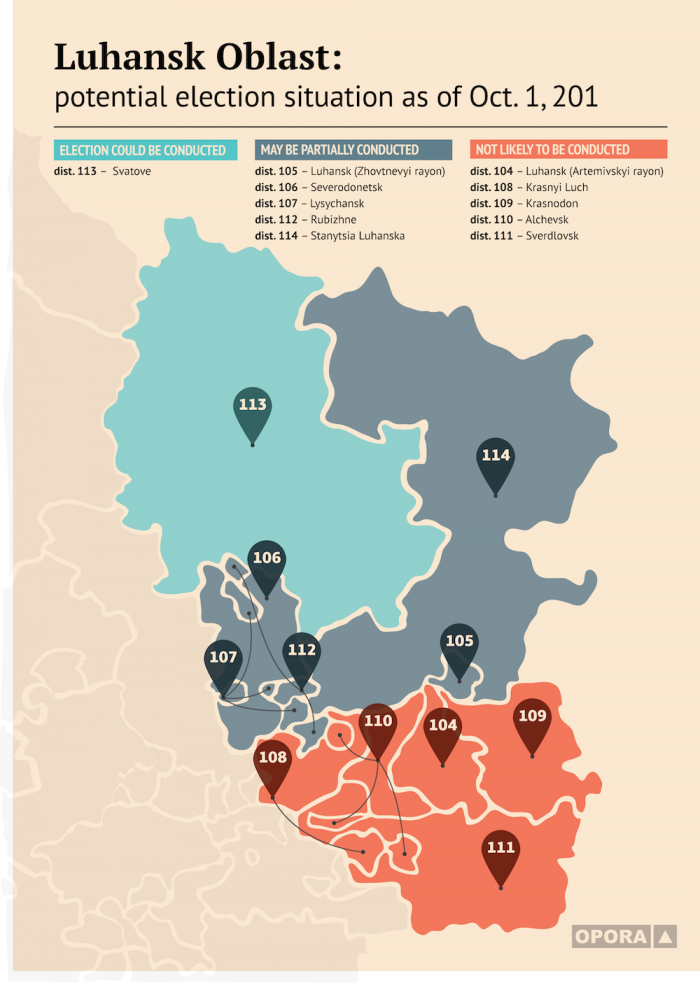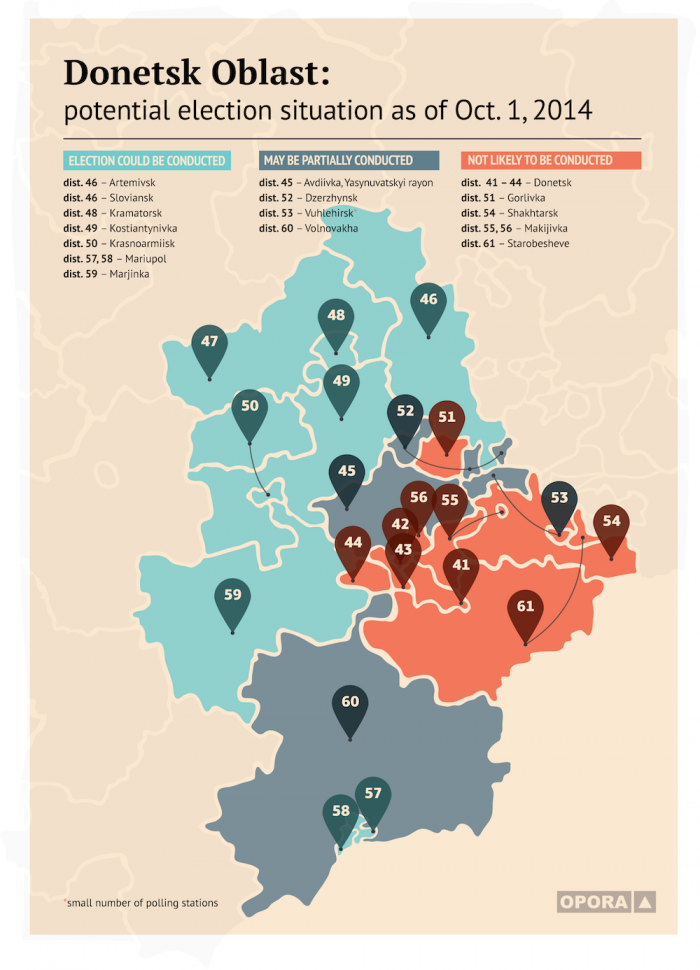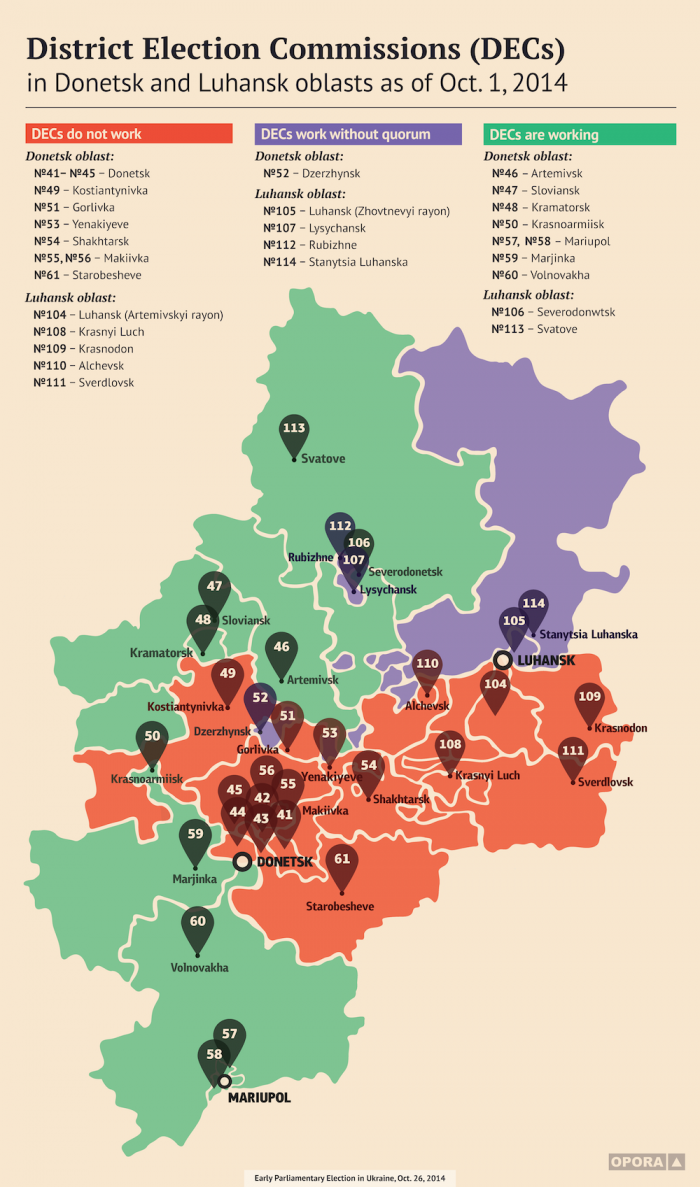Early Parliamentary elections in Ukraine are being organized while the military aggression of regular army units of the Russian Federation and illegal armed groups in some raions of Luhansk and Donetsk oblasts continues. In the best-case scenario, according to OPORA's estimation as of 1 October, the elections will be held in 18 of 32 districts of Donbass; in the worst-case scenario – only in 9. Less than 10 of 52 political parties registered in the CEC as electoral subjects conduct systematic nationwide campaigning activities. The false start of the election campaigning was the major tendency in September. Parties and majoritarian candidates started massive dissemination of campaigning materials and conduction of public events yet before registration in the CEC. Besides that, observers reported incidents of indirect voter bribery.
Extreme background of these Parliamentary elections stirred up challenges that have no direct relation to the election process but need efficient counteraction. According to the Electoral and Parliamentary Programs Coordinator at Civil Network OPORA Olha Aivazovska, there are at least 5 key threats: "Safety during organization and conduct of the voting process on territories involved in conflict; protection of election commission members and their stable functioning; transportation of election documentation and ballot papers; free access to impartial and balanced information to citizens living in the operational area, and voting with any pressure, threats or harassment by illegal armed groups." Although OPORA's observers reported numerous incidents of bribery, the misuse of administrative resources is not widespread during this election campaign.
Situation in Donbas is still tense. There are 32 district election commissions in Donetsk and Luhansk oblasts, but only 10 of them are fully functioning, 5 are still trying to organize themselves, and 17 are inactive. Oleksandr Kliuzhev, OPORA's analyst states: "As of 1 October, according to OPORA's estimation, the election campaign and the voting can be organized at all polls in 8 districts (ED #46-50, 55-59), at some polls in districts #45, 52, and 53, and at no polls in the remaining 9 districts of Donetsk oblast. In Luhansk oblast, the voting can be organized fully in one district (ED #113 centered in city of Svatovo), partly in 5 districts (ED #105-107, 112, and 114), and cannot be organized in 5 districts (ED #104, 108-111). This tendency remains stable since 10 September, when OPORA's observers promulgated preliminary data on the voting on territories of military operations."



Similarly to the previous Parliamentary elections, membership of district election commissions (DECs) suffered from mass rotations from the very formation of commissions. As of 1 October, 936 members were substituted in 213 DECs, what is almost 25% of the total membership. Most of substitutions were made in Donetsk oblast, almost 36% of commission members in this region. DECs in Odesa, Kirovohrad, Kherson, Lviv, Dnipropetrovsk, and Zakarpattia oblasts had 30% of their members substituted. DECs in Ternopil, Volyn, and Zhytomyr oblast turned out to be the most stable. Most of rotations in DECs were made in September by the following political parties: the Our Ukraine, the Greens, the Ukraine of the Future, the Ukrainian Platform Sobor, the Green Planet Ukrainian Party, the Party of Greens of Ukraine, the Radical Party of Oleh Liashko, the Party of Regions, the Party of Pensioners of Ukraine, and the AUU Svoboda.
Despite the disputes on lustration and "full renewal" of the newly-elected parliament, 302 MPs of the Verkhovna Rada of VII convocation participate in these elections, and most of them are nominated by the Petro Poroshenko Block (42 candidates). OPORA's analyst Oleksandr Neberykut stated: "The typical portrait of a majoritarian district is the following: a person with higher education (92.17%), man (87.13%), employed (85.82%), of middle age from 36 to 59 years (66.23%), and unaffiliated (64.19%). At the same time, the number of women candidates has increased in party lists (25.78%), the number of young candidates has increased as well (32.17%) if compared to the previous parliamentary elections.
Among 52 electoral subjects registered in the CEC, the AUU Batkivshchyna, the Civic Position, and the Petro Poroshenko Block conducted the most prominent campaigning. The People's Front, the Radical Party, the AUU Svoboda, the Samopomich NGO and the Strong Ukraine were less active. Besides that, observers reported outdoor advertising of the All-Ukrainian Agrarian Union Zastup, the Internet Party of Ukraine, the Liberal Party, the Opposition Bloc, and the Party 5.10. Campaigning materials usually are not regionally-oriented. They are usually designed by the center and are the same for all regions.
INTERIM REPORT on the Results of Observation Conducted by the OPORA during Early Parliamentary Elections in Ukraine:September 2014
Twitter: https://twitter.com/opora (@opora, #вибори14, #elect_ua)